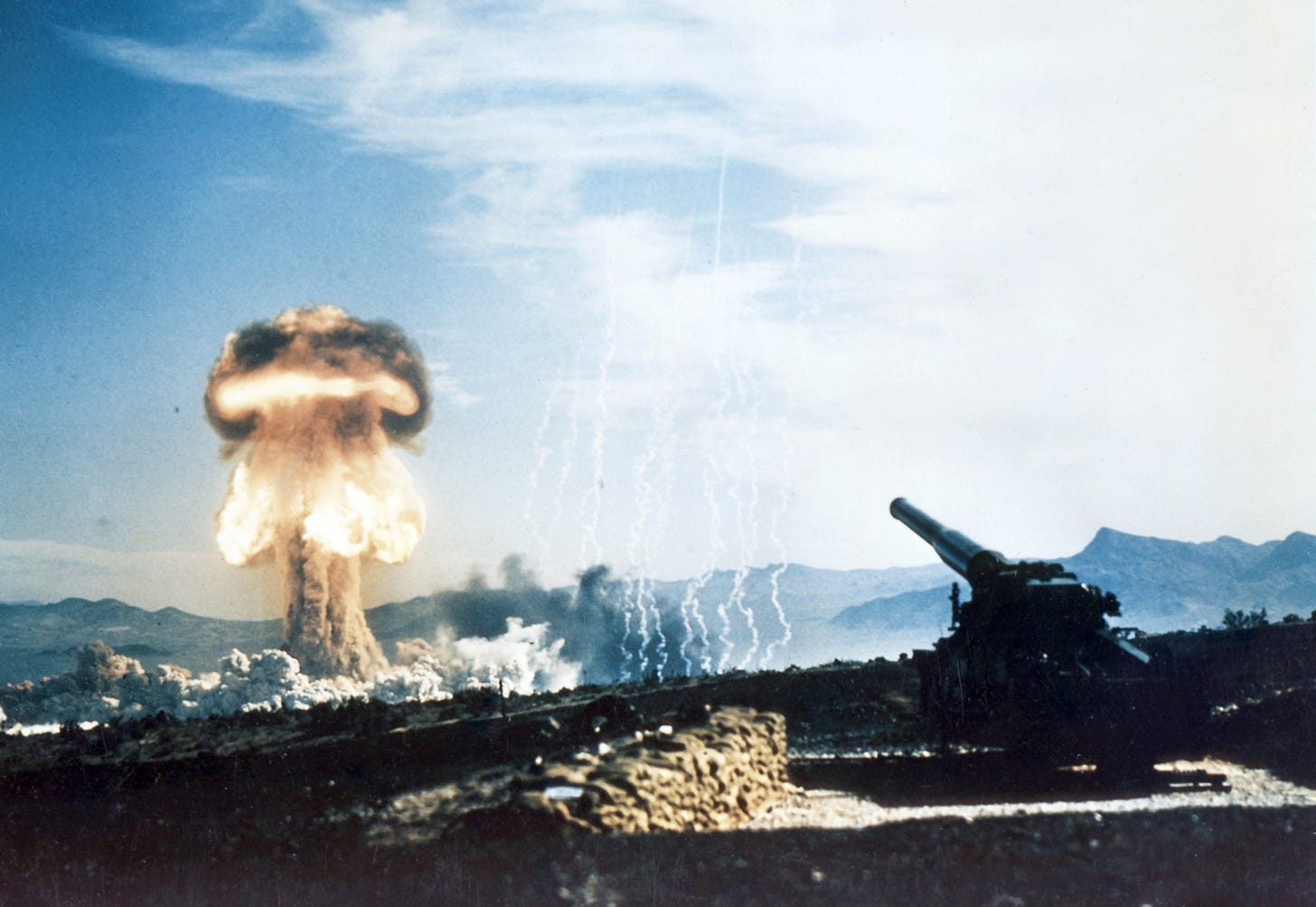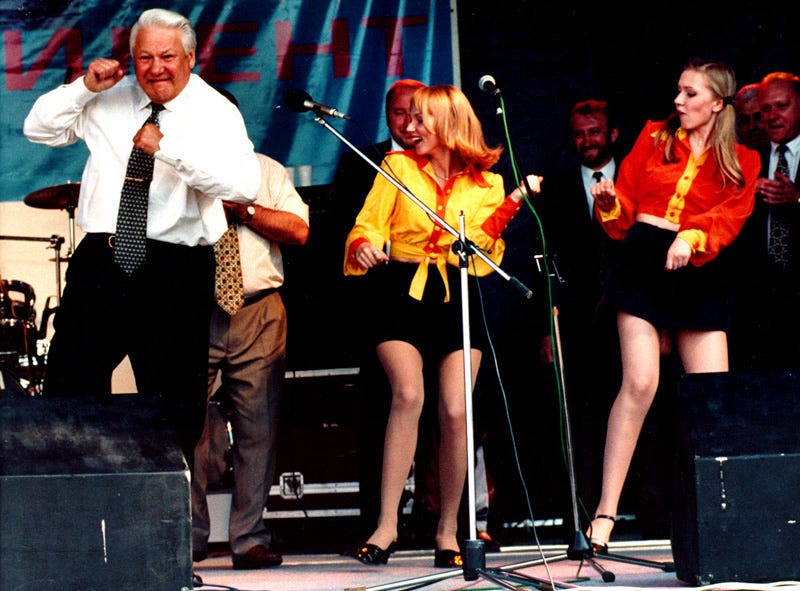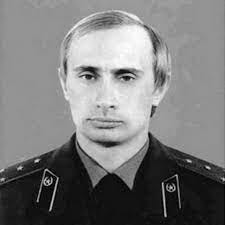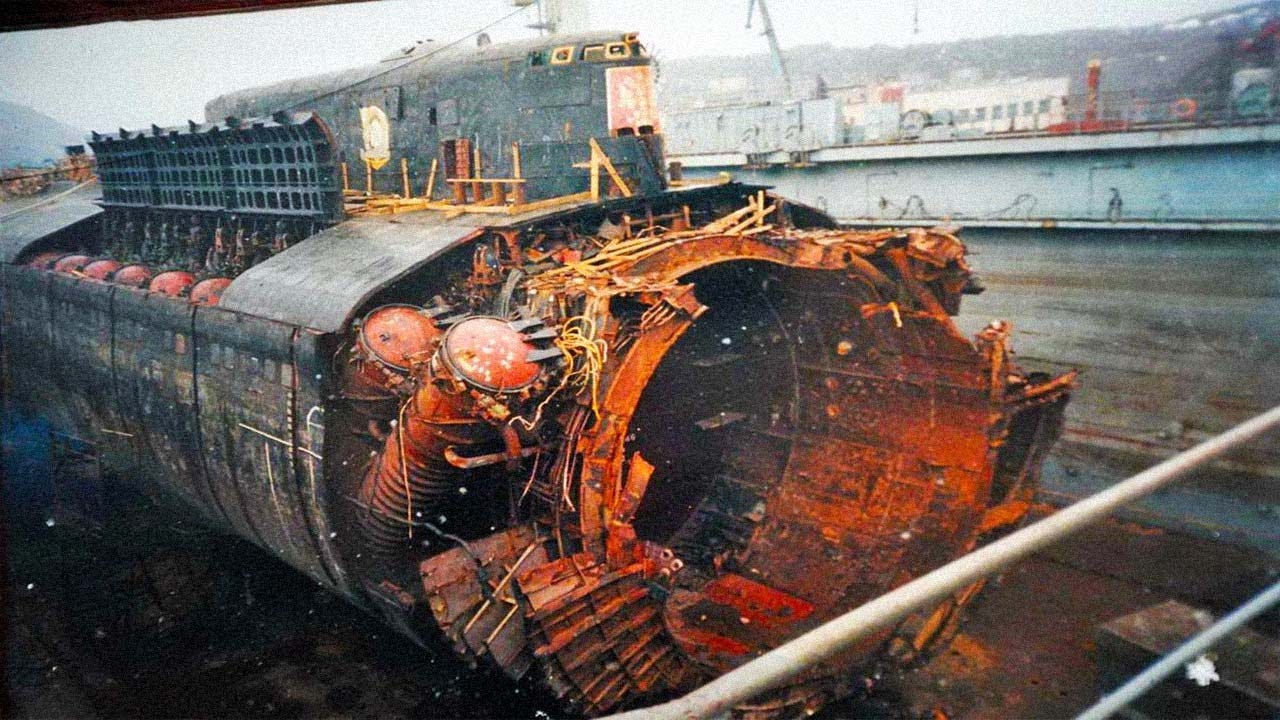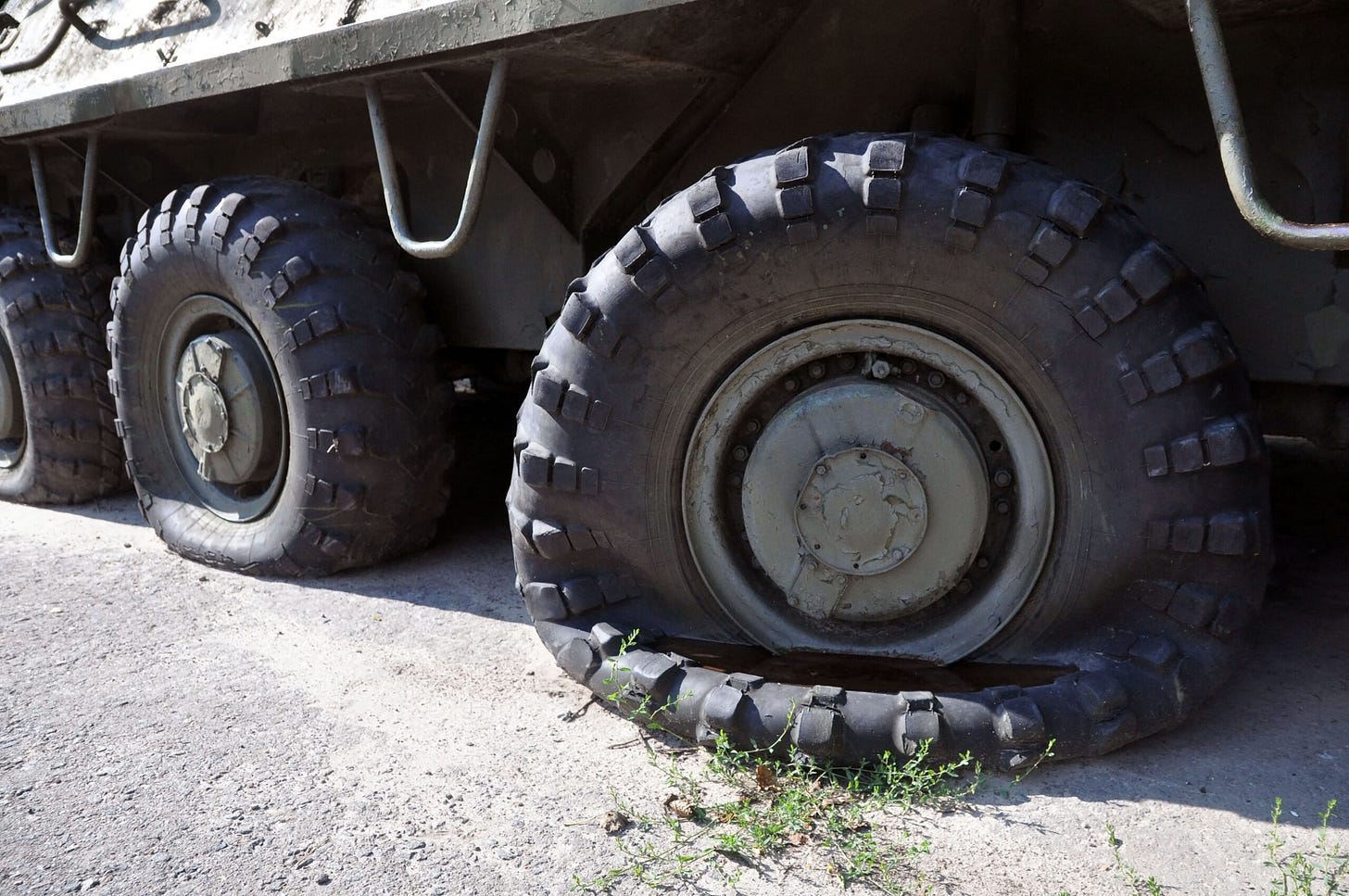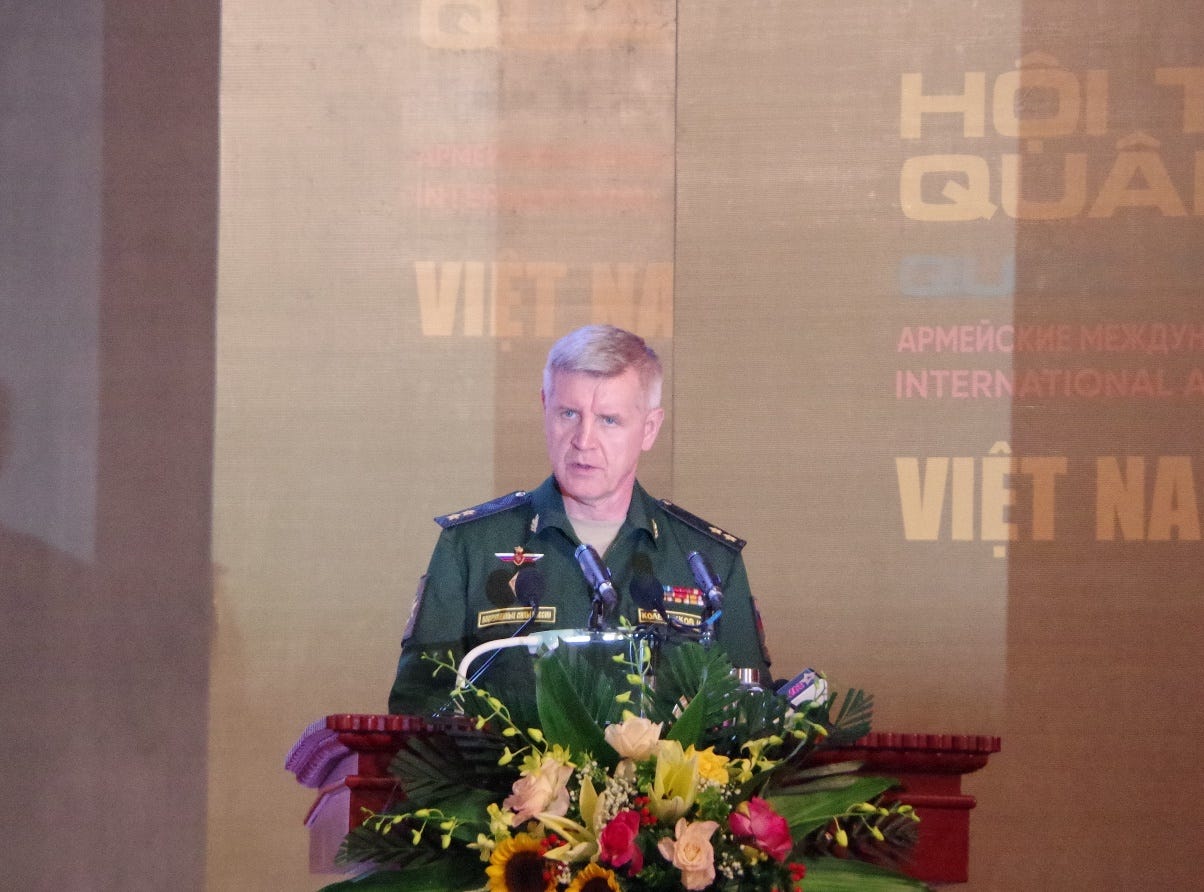HOW MANY TACTICAL NUKES WILL PUTIN USE AGAINST UKAINE?
Is Putin holding a bunch of aces or is his hand a dud?
Before I make good on the headline above, I started writing this newsletter on Tuesday with the intention of distributing it on the weekend. But the news overnight has put a rocket under distribution. The news, of course, is Putin’s announcement that he has initiated a partial mobilization of reservists to raise 300,000 fresh warm bodies, and will send them off to Ukraine with two week’s training.
Interesting. While it’s true that quantity has a quality all its own, it helps enormously if you can motivate, arm and feed that quantity for it to have even a shed of quality, and those three necessitates have been in short supply for the unfortunate Russian boys currently on the front lines. Those 300,000 reluctant recruits? Even if Putin can get them to the battlefields, they’ll surely infect everyone around them with their reluctance, heightening the chances of mass surrenders. Essentially, far from bolstering the increasingly isolated Russian leader’s chances of securing any kind of victory in this war, the partial mobilization will hasten his defeat.
The other significant point in Putin’s tangled conspiracy-laden and somewhat shrill speech? This: “If the territorial integrity of our country is threatened, we will without doubt use all available means to protect Russia and our people - this is not a bluff.”
The renewed nuclear threat is tied up with the plans to hold referenda in the regions of Donetsk, Luhansk, Zsphorizhzhisa and Kherson, a prelude to Russia officially annexing these territories. (Incidentally, no matter which way the residents of these areas vote, everyone knows what the official result of the vote will be, right?) In Putin’s mind, these annexed regions officially then become Russian soil. And so any attack on them will be considered a direct attack on Russia, an existential threat that allows the Kremlin to call up the nukes.
Meanwhile, Ukraine has said it will continue to recapture its sovereign territory no matter what Putin threatens. This is a real problem for Vlad. What if these territories are officially (as far as Russia is concerned) annexed and Ukraine keeps coming? Having threatened to use nukes, when Ukraine attacks this new “Russian territory” as it undoubtedly will, is he then left with no option but to unleash hell?
So while these developments weren’t the impetus to write the following column, as I more or less said at the outset, it has forced me to get my skates on. Events are moving pretty fast in Ukraine and I don’t want to get caught with my pants around my ankles - not a pretty sight.
Cheers
David
The answer is none. Putin won’t use nuclear weapons because there’s a good chance that he doesn’t have any. Any reliable ones, at least. Wait, I hear you say. Don’t the nuclear watchdogs say he has 4,497 warheads, of which 1,458 are active? Yes, they do, but I still insist that Putin probably doesn't have any he can fire off.
Before you dismiss this assessment, stick around for the rationale.
To begin with, the nuke he would call up has to be tactical. Nuclear arms watchdogs estimate that of those 4,497 nuclear warheads, around 2,00m are of the tactical variety. The tactical nuke has a relatively low kiloton yield compared to a city-killing intercontinental ballistic missile (ICBM). It could be roughly the power of the bomb that hit Hiroshima in August 1945 — a yield of 15 kilotons. But it could also have a much larger yield, up to 100 kilotons. But one weapon would not be enough. Around 20 of the things would be required to stave off the retaliation from NATO that would almost certainly follow. Of course, NATO may choose not to get involved for fear further escalating the conflict. But this is not an absolute given. US President Biden said the response would be “consequential” without revealing the specific consequences. But you’d have to think that they would be meaningful and military because if they aren’t, the ambitions of every tyrant across the planet will be gree-lit. And Putin will win in Ukraine. So let’s assume Putin needs those twenty or so tactical nukes to be on the safe side. And let’s also assume he’s dismissive of any Western quid pro quo response. He fully intends to send them down range…
“And if they couldn't get vodka,” he assured me, “they’d drink the glycol out of the air-conditioning units.”
At this point, cut to a conversation I had a few years back with an American buddy of mine stationed with US Forces in Japan in the mid-eighties when Cold War paranoia was high. He told me that everyone knew that the Soviet Union just across the Sea of Japan was a rusted-out hulk. He told me that the Russian pilots they faced off against, were constantly drunk on Vodka. “And if they couldn't get vodka,” he assured me, “they’d drink the glycol out of the air-conditioning units.” I asked him why, if the US political and military establishments knew the USSR was on its knees, did they persist with the farce?
The reply (I can’t remember his exact words) went something along the lines of that it suited everyone’s purpose. It was the US Military Industrial Complex’s business strategy to promote the fear of nuclear holocaust because it made so much money out of maintaining the military build-up. Also, the nuclear standoff had practical benefits — the threat of mutually assured destruction (the MAD doctrine) had kept the peace between the great powers since the conclusion of WWII so, farce or not, the vast weapons stockpile was doing a worthwhile job.
A few years later, in 1989, the Berlin Wall came down and the collapse of the Soviet Union followed soon after. One of the primary reasons for the implosion was that the USSR was broke (yes, yes, there were other reasons such as the failure of the war in Afghanistan — a belief vacuum in the leadership, desperate shortages in every supply chain imaginable and so forth).
Boris Yeltsin, the dancing drunk who took over from Mikhail Gorbachev, oversaw the final dissolution of the Soviet Union in 1991. A period of civil chaos then followed when a small number of Russian citizens stole the nation’s wealth for a song, and became disgustingly rich and exceedingly powerful.
Having set Russia on a path of accommodation with the West, Yeltsin left office in 1999 and handed the reins to a young, virtually unknown former KGB agent by the name of Vladimir Putin. The new president realised quickly that this small number of oligarchs were the real power in Russia and set about creating some oligarchs of his own, setting Russia on the path to kleptocracy. It has been said that today this kleptocracy operates like a mob family (far richer but not nearly as cool as Tony Soprano’s). The oligarchs depend on Putin for their continued wealth, and Putin depends on these oligarchs who pay homage to him for his continued power.
What does any of this have to do with nuclear weapons? I’m getting to it — this backgrounding is important. The central point to hold onto
here is that Russia isn’t a rich nation - its wealth has been stolen by individuals and continues to be stolen on a daily basis.
A four-page summary of the report eventually made public revealed, "stunning breaches of discipline, shoddy, obsolete and poorly maintained equipment", and "negligence, incompetence, and mismanagement."
This brings me to the Kursk disaster in 2000, not long after Putin took the reins. The Kursk was a Russian nuclear-powered submarine, a symbol of Russia’s military might, and it sank killing all 118 crew while engaged in Russian Navy exercises, the first in 10 years. These exercises were supposed to be an announcement to the world, a “We’re back!”
The West offered to help Russia rescue its doomed Kursk submariners, but Putin, on vacation, held off allowing the Russian navy to accept this assistance for five days. The Kursk was later salvaged, the disaster investigated, and a top-secret 133-volume report subsequently produced. A four-page summary of the report eventually made public revealed, "stunning breaches of discipline, shoddy, obsolete and poorly maintained equipment", and "negligence, incompetence, and mismanagement."
…to call out just a few issues, the cheap replacement tires on Russian armored personnel carriers splitting, the engines and fire control systems in its tanks failing, a high percentage of old soviet-era ammunition failing to detonate, the 60 percent failure rate of its precision-guided missiles (PGMs), it’s much-hyped hypersonic “Kinzhal” missiles failing to reach hypersonic speeds, and so forth.
These same words have been used by military analysts to describe the equipment used by the Russian military in its invasion of Ukraine — to call out just a few issues, the cheap replacement tires on Russian armored personnel carriers splitting, the engines and fire control systems in its tanks failing, a high percentage of old soviet-era ammunition failing to detonate, the 60 percent failure rate of its precision-guided missiles (PGMs), it’s much-hyped hypersonic “Kinzhal” missiles failing to reach hypersonic speeds, and so forth.
The conclusion reached by professional observers about this failure of Russia’s military, prior to the invasion of Ukraine considered to be the world’s second-most formidable1, is that much of the money allocated for maintenance and modernization has been siphoned off by corrupt officials. Kleptocracy - the notion that when you can “get some”, you’re mad if you don’t - runs deep in Russia’s military too.
Kleptocracy - the notion that when you can “get some”, you’re mad if you don’t - runs deep in Russia’s military too.
The salary of a Russian general per month is said to be around 300,000 rubles, which at the current exchange rate is US$4885.00 per month. It’s hard to believe a Russian general wouldn’t have a dacha in Moscow, one in St Petersberg and probably a sweet little bolthole in London and maybe Switzerland too.
Putin’s top general, his chief of staff is Army General Valery Gerasimov. His net worth is said to be US$1.5m. How do you get a nest egg of 1.5 large on a salary of $60k? Actually, I would be happy to bet the 20-year-old rattler that I run around in that Gersasimov’s posted net worth has been scuppered by a typo or two and is actually closer to US$1.5bn. Or maybe US$15bn. Who knows, maybe even US$150bn.
The department that oversees Russia’s nuclear weapons is the 12th Chief Directorate of the Ministry of State. And the general heading up this directorate is Lieutenant General Igor Kolesnikov. It would be interesting and revealing about the true state of Russia’s nuclear arsenal to have his net worth revealed.
Keep reading with a 7-day free trial
Subscribe to News from author David Rollins to keep reading this post and get 7 days of free access to the full post archives.


